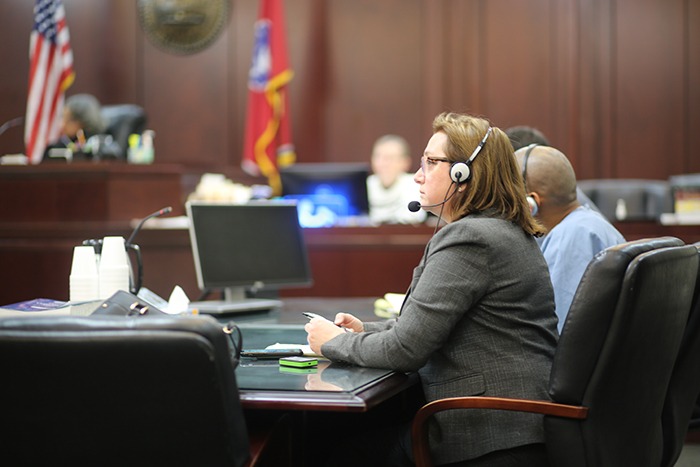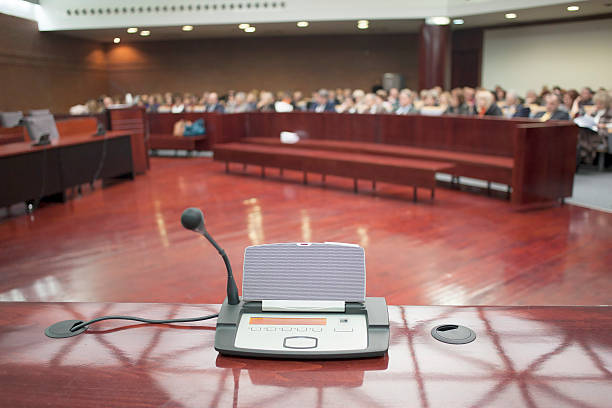Lost in Translation: The Untold Stories of Courtroom Interpreters
The courtroom is a place where justice is served, legal battles are fought, and the rights of individuals are protected. However, in a diverse society where people speak different languages, ensuring equal access to justice becomes a challenge. This is where courtroom interpreters play a vital role. In this article, we will explore the essential role of courtroom interpreters in facilitating effective communication, upholding due process, and promoting fairness within the judicial system.
Table of Contents
Introduction
In a multicultural and multilingual society, it is crucial to ensure that all individuals, regardless of their language proficiency, have equal access to the justice system. Courtroom interpreters bridge the language barrier, enabling effective communication between the parties involved in legal proceedings. Their role goes beyond mere translation; they act as the voice of justice, facilitating clear understanding and protecting the rights of all individuals involved.
The Importance of Clear Communication
Clear communication is the cornerstone of any judicial proceeding. Without it, misinterpretations, misunderstandings, and even miscarriages of justice can occur. Courtroom interpreters play a pivotal role in promoting clear and accurate communication between judges, attorneys, witnesses, defendants, and other participants. They ensure that everyone understands and is understood, thus preserving the integrity of the legal process.
The Role of Courtroom Interpreters
Courtroom interpreters serve as the crucial link between individuals who speak different languages. Their primary responsibility is to accurately interpret spoken words from one language to another, maintaining the meaning, tone, and nuances of the original message. They are present in various legal settings, including hearings, trials, depositions, and client interviews. By providing language assistance, they enable effective participation and comprehension for non-English speakers.
Qualifications and Skills of Courtroom Interpreters
Courtroom interpreting demands a high level of linguistic proficiency and specialized skills. Interpreters must possess exceptional command of both the source and target languages, including legal terminology and jargon. They need to have excellent listening and memory retention skills to ensure accurate interpretation in real-time. Furthermore, cultural competency, impartiality, and confidentiality are essential attributes for courtroom interpreters to maintain the integrity of the proceedings.
Challenges Faced by Courtroom Interpreters
Courtroom interpreters face unique challenges in their line of work. They must navigate complex legal concepts, emotional testimonies, and high-stress environments while maintaining accuracy and impartiality. They encounter linguistic challenges, such as idiomatic expressions, regional dialects, and unfamiliar terminology. Additionally, managing the dynamics between the participants, including interruptions and overlapping speech, requires skillful interpretation to prevent miscommunication.
Ensuring Accuracy and Impartiality
To uphold the integrity of the legal process, courtroom interpreters must adhere to principles of accuracy and impartiality. They strive to provide a faithful rendition of the spoken words without adding, omitting, or altering any information. Interpreters must remain neutral and avoid personal biases, ensuring that all parties receive equal treatment. Their role is pivotal in safeguarding due process and maintaining the credibility and fairness of the proceedings.
The Impact of Technology on Courtroom Interpreting
Advancements in technology have influenced the field of courtroom interpreting. With the introduction of remote interpreting, interpreters can provide their services via video or telephone, eliminating geographical barriers. However, the use of technology presents its own set of challenges, such as technical difficulties, limited visual cues, and potential privacy concerns. Balancing the benefits of technology with the need for in-person interpretation requires careful consideration.
The Role of Training and Certification
To ensure the highest standards of courtroom interpreting, professional training and certification programs play a crucial role. These programs equip interpreters with the necessary skills, knowledge, and ethical guidelines. Training encompasses language proficiency, legal terminology, code of conduct, and cultural sensitivity. Certification provides recognition of an interpreter’s competence and ensures their adherence to professional standards, enhancing the overall quality and reliability of courtroom interpreting services.
Courtroom Interpreting Best Practices
To deliver effective interpretation, courtroom interpreters follow a set of best practices. They prepare by familiarizing themselves with case materials, researching relevant legal terminology, and consulting with attorneys beforehand. During proceedings, they maintain professionalism, accuracy, and confidentiality. They strive to be unobtrusive, interpreting consecutively or simultaneously while preserving the flow and pace of the proceedings. Continuous professional development and staying up-to-date with legal changes are vital to provide the best service possible.
Promoting Access to Justice
Courtroom interpreters play a crucial role in promoting access to justice for individuals with limited English proficiency. By facilitating communication, they ensure that everyone can fully understand and participate in legal proceedings. This inclusivity is essential to protect the rights of non-English speakers and maintain a fair and equitable justice system. The presence of qualified interpreters helps create an environment where all individuals are treated equally under the law.
Cultural Sensitivity and Diversity
Courtroom interpreters navigate the intersection of language and culture, requiring them to be culturally sensitive and aware. They must understand the cultural nuances and customs of both the source and target languages to accurately interpret messages. Respecting cultural differences and avoiding assumptions or stereotypes is paramount to provide effective interpretation. By embracing diversity, courtroom interpreters contribute to a more inclusive and just legal system.
The Costs and Benefits of Courtroom Interpreters
The provision of courtroom interpreting services incurs costs, but the benefits outweigh the expenses. The presence of interpreters reduces the risk of miscommunication, which can lead to costly retrials or appeals. Moreover, by ensuring equal access to justice, interpreters contribute to the overall fairness and efficiency of the judicial system. Recognizing the value of courtroom interpreters and allocating resources for their services is an investment in upholding the principles of justice.
Recognizing the Role of Courtroom Interpreters
While courtroom interpreters are vital to the functioning of the justice system, their role often goes unnoticed or underappreciated. It is essential for legal professionals, policymakers, and the public to recognize and value the contributions of courtroom interpreters. Their work facilitates the administration of justice, protects the rights of individuals, and upholds the fundamental principles of fairness and equality.
Conclusion
Courtroom interpreters serve as the voice of justice, enabling effective communication and ensuring equal access to the legal system. Their skills, qualifications, and dedication play a crucial role in upholding due process, protecting the rights of non-English speakers, and maintaining the integrity of legal proceedings. As society becomes increasingly diverse, the essential role of courtroom interpreters becomes more evident than ever before.
FAQs
A courtroom interpreter is responsible for facilitating communication between individuals who do not speak the same language during legal proceedings, ensuring everyone has a voice in the courtroom.
Courtroom interpreters play a crucial role in ensuring that all parties involved, including defendants, witnesses, and attorneys, can effectively communicate their thoughts, testimony, and arguments, thus contributing to a fair and just legal process.
Courtroom interpreters can work with a wide range of languages depending on the needs of the court and the individuals involved. Common languages include Spanish, Mandarin, Arabic, French, Russian, and many others.
professional courtroom interpreters typically undergo rigorous training and certification processes to ensure their language proficiency, cultural competence, and understanding of legal terminology, ethics, and courtroom protocols.
Yes, experienced courtroom interpreters are trained to work in high-pressure environments and maintain their impartiality and accuracy while interpreting complex legal discussions, emotional testimonies, and intense cross-examinations.
Courtroom interpreters use both simultaneous and consecutive interpretation techniques. Simultaneous interpretation involves interpreting in real-time while the speaker is talking, often using specialized equipment. Consecutive interpretation involves the interpreter speaking after the speaker has finished a segment or sentence.
Absolutely! Courtroom interpreters are trained to interpret using legal terminology accurately. They have a solid understanding of legal concepts and vocabulary to ensure accurate communication between all parties involved.
Courtroom interpreters typically undergo extensive training programs that include language proficiency assessments, legal interpreting courses, ethical guidelines, and courtroom observation. Certification processes vary by jurisdiction and may involve written and oral examinations.
Yes, courtroom interpreters are bound by strict codes of confidentiality and professionalism. They are ethically obligated to keep all information disclosed during the proceedings confidential.
Yes, individuals who do not speak the language of the court have the right to request a courtroom interpreter to ensure their understanding and participation in the legal proceedings. The court should provide an interpreter if deemed necessary.








